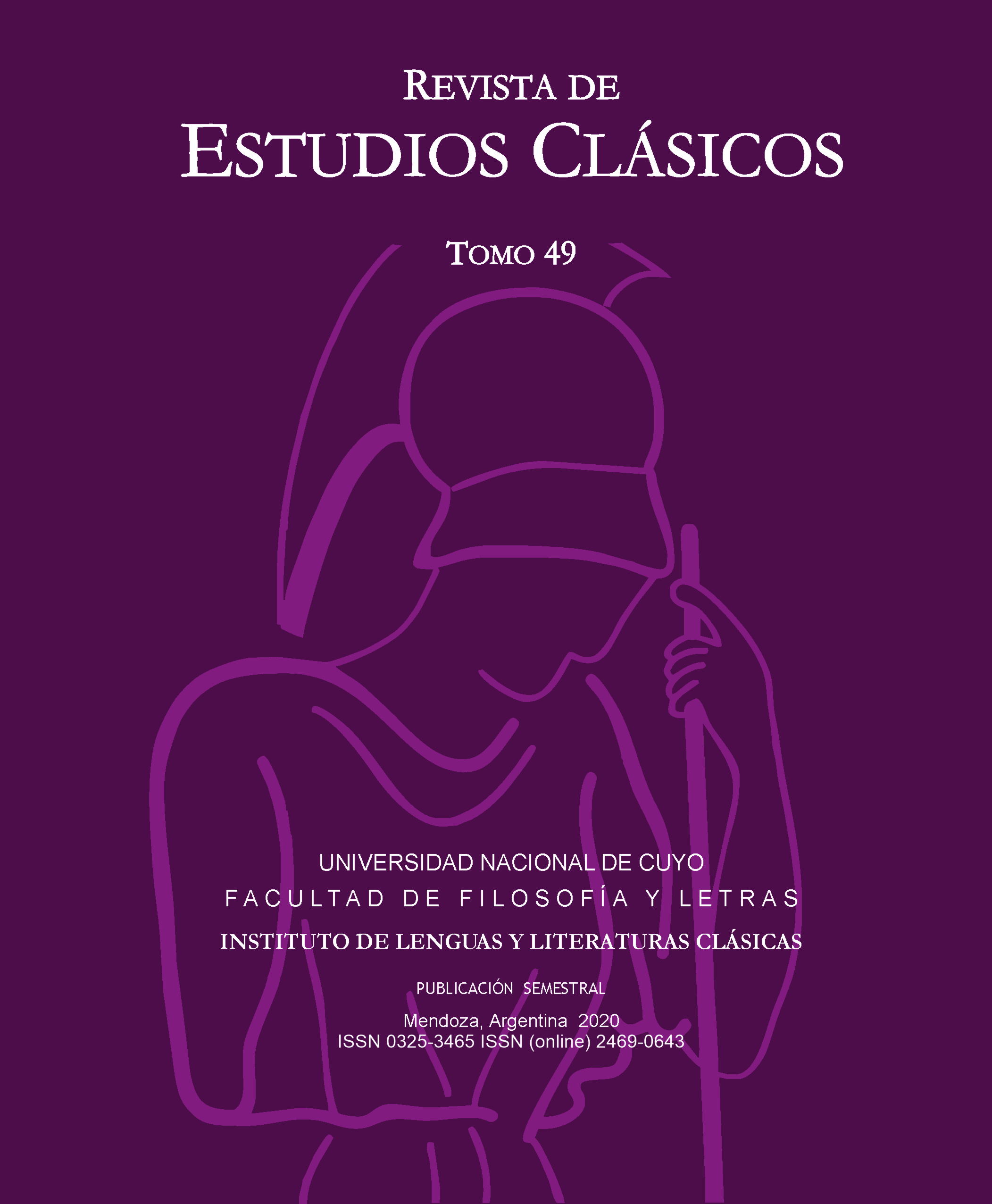Life facing death: speech of Achilles in front of Patroclus’body
Keywords:
Archaic and Classical Greece, death, Funerary Epigrams, IliadAbstract
In this article, a comparison will be made between the speech that Achilles, in the Iliad, addresses in front of Patroclus’s body, and some of the Attic funerary epigrams from the Classical Age (compiled by Hansen). The goal of this comparison is neither stylistic nor syntactic, but tracking ideas and concepts; it intends to achieve a greater knowledge of what it was that both Homeric and Classical societies had in mind when facing death. It will begin with Achilles’s speech, where the concepts that also appear in the epigrams will be highlighted. So, it will be evident in which way some ideas remained through the centuries and why.
References
Alexiou, M. (2002). The ritual lament in Greek tradition. 2ª ed. Cambridge: University Press.
Aristóteles. (2005) Política. Tr. Pedro López Barja y Estela García Fernández. Madrid: Istmo.
Bernabé, A. (ed.) (2001). De Tales a Demócrito, 2ª ed. Madrid: Alianza.
Bowra, C. M. (1968). Introducción a la literatura griega. Madrid: Guadarrama.
Bruit, L. y P. Schmitt (2002). La religión griega en la polis de la época clásica, tr. Ma. de Fátima Díez Platas. Madrid: Akal.
Burkert, W. (2007). Religión griega. Arcaica y clásica, tr. Helena Bernabé. Madrid: Abada Editores.
Cairns, D. L. (2001). Oxford Readings in Homer’s Iliad. Oxford.
Clarke, W. M. (1978), "Achilles and Patroclus in love", Hermes 106: 381-95.
Demóstenes.(1983). Discursos privados I, trad. José Manuel Colubi Falcó. Madrid: Gredos.
Derderian, K. (2001). Leaving Words to Remember: Greek Mourning and the Advent of Literacy, Leiden et al.: Brill.
Diógenes Laercio.(2007). Vidas y opiniones de los filósofos más ilustres, tr. Carlos García Gual, Madrid: Alianza.
Fränkel, H. (1993). Poesía y filosofía de la Grecia Arcaica. Una historia de la épica, la lírica y la prosa griegas hasta la mitad del siglo quinto. Madrid: Visor.
Garland, R. (1985). The Greek way of death., New York: Cornell University Press.
Ginestí Rosell, A. (2013). "Las profesiones de los metecos en el texto y en la imagen", Faventia Supplementa 2. Contacto de poblaciones y extranjería en el mundo griego antiguo, pp. 287-302.
Hansen, P. A. (ed.) (1989). Carmina epigraphica graeca. Vol. 2, Saeculi IV a.Chr.n.. Berolini: De Gruyter.
Hesíodo.(1997). Obras y fragmentos, trad. Aurelio Pérez Jiménez y Alfonso Martínez Díez. Madrid: Gredos.
Homero (2007). Odisea, trad. José Manuel Pabón, int. Carlos García Gual. Madrid: Gredos.
Homero.(1991). Ilíada, trad. Emilio Crespo, int. Carlos García Gual. Madrid: Gredos.
Iseo.(1996). Discursos, trad. Ma. Dolores Jiménez López, Madrid: Gredos.
Isócrates.(1982). Discursos I, trad. Juan Manuel Guzmán Hermida. Madrid: Gredos.
Kanavou, N. (2015). The Names of Homeric Heroes. Problems and Interpretations. Berlin / Boston: De Gruyter.
Kurtz, D. and J. Boardman. (1971). Greek Burial Customs. London: Thames and Hudson.
Lesky, A. (2009). Historia de la literatura griega. Madrid: Gredos.
Lisias.(1995). Discursos II, trad. José Luis Calvo Martínez. Madrid: Gredos.
López Eire, A. (2000). Homero. En López Férez, J. A. (ed). Historia de la literatura griega (pp. 33-65). Madrid: Cátedra.
Meyer, Elizabeth A. (1993). Epitaphs and Citizenship in Classical Athens", The Journal of Hellenic Studies, Vol. 113, pp. 99-121.
Morris I. and B. Powell (1997). A New Companion to Homer. Leiden: Brill.
Peek W. (ed.) (1988). Greek Verse Inscriptions. Epigrams on Funerary Stelae and Monuments. Chicago: Ares Publishers.
Platón (2005). Política, Trad. Pedro López Barja y Estela García Fernández. Madrid: Istmo.
Rodríguez Adrados, F. (1981). El mundo de la lírica griega antigua. Madrid: Alianza.
Seaford, R. (1995). Reciprocity and ritual: Homer, Tragedy in the Developing City-state. Oxford: Clarendon Press.
Tsagalis, Ch. C. (2008). Inscribing Sorrow: Fourth-Century Attic Funerary Epigrams, Vol. 1. Berlin, New York: Walter de Gruyter.
Vernant, J.-P. (2001). El individuo, la muerte y el amor en la antigua Grecia, tr. Javier Palacio, Barcelona: Paidós.
Zumin, A. (1961). Epigrammi sepolcrali anonimi d’età classica ed ellenistica, Rivista di cultura classica e medioevale, Anno III, numero 2, maggio-agosto, Roma: Edizioni dell’Ateneo, pp. 186-223.
Downloads
Published
How to Cite
Issue
Section
License
Aquellos autores/as que tengan publicaciones con esta revista, aceptan los términos siguientes:
- Los autores/as conservarán sus derechos de autor y garantizarán a la revista el derecho de primera publicación de su obra, el cuál estará simultáneamente sujeto a laLicencia Creative Commons Atribución-NoComercial-CompartirIgual 2.5 Argentina (CC BY-NC-SA 2.5 AR). (https://creativecommons.org/licenses/by-nc-sa/2.5/ar/)que permite a terceros compartir la obra siempre que se indique su autor y su primera publicación esta revista.
- Los autores/as podrán adoptar otros acuerdos de licencia no exclusiva de distribución de la versión de la obra publicada (p. ej.: depositarla en un archivo telemático institucional o publicarla en un volumen monográfico) siempre que se indique la publicación inicial en esta revista.
- Se permite y recomienda a los autores/as difundir su obra a través de Internet (p. ej.: en archivos telemáticos institucionales o en su página web) antes y durante el proceso de envío, lo cual puede producir intercambios interesantes y aumentar las citas de la obra publicada. (Véase El efecto del acceso abierto).












